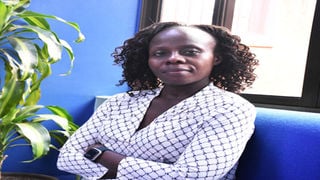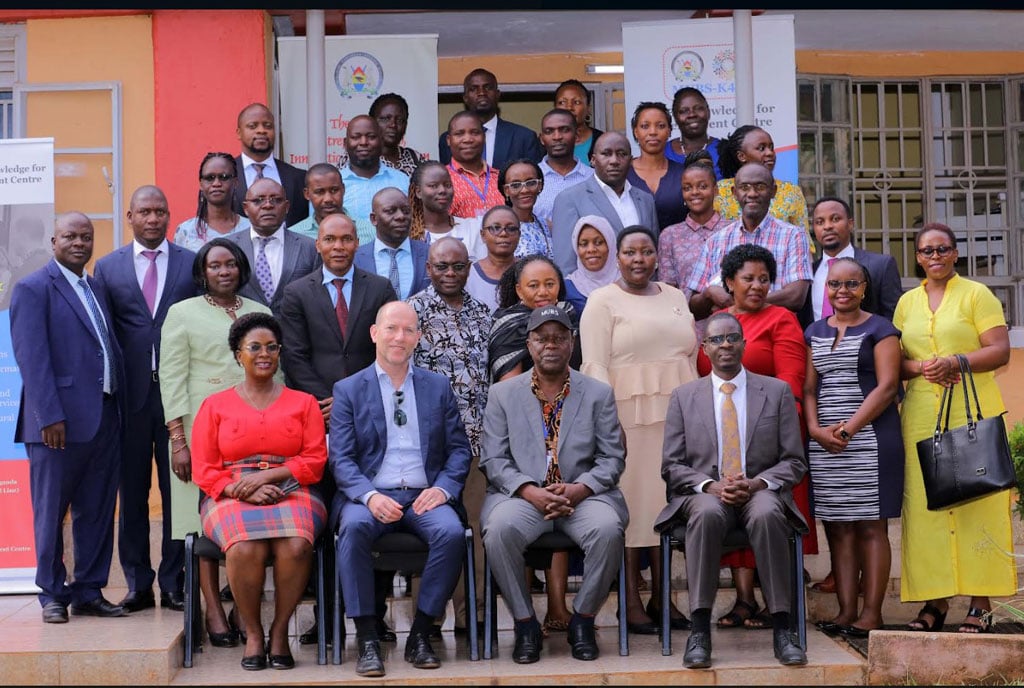
Elizabeth Rwabu.
|Education
Prime
Elizabeth Rwabu marries technology and disability
What you need to know:
- Elizabeth Rwabu trains children on how to solve community and environmental problems using technology to.
Elizabeth Rwabu’s fate of being a doctor started fading after her father’s death. He is the greatest teacher she had ever known. At high school, she lost interest in sciences while excelling arts.
Rwabu knew she wanted to be a teacher like her parents. After Senior Six, she joined National Teacher’s College in Kaliro, since she could not afford university education.
“My teaching subjects were Geography and CRE. I dreamt of teaching in big schools since I needed enough to money to pay my siblings’ fees. For this to happen, I knew I had to be unique,” Rwabu says.
Computer was the target subject, since there were few teachers then. Earlier on, her elder brother had interested her in learning computer because he had been excited about having powered on one.
“Those days, I only knew how to play few games such as scrabble on the computer,” she recalls.
During her Senior Six vacation, Rwabu took advantage of her access to the Kira College Butiki computer laboratory. There, she taught herself the necessary applications starting with Microsoft Office. Luckily, she got placement at Kira College, Butiki. The head teacher asked her about her teaching subjects apart from Geography and CRE, she said Computer, which impressed him. It was the only available slot.
In 2004, Rwabu was advised to upgrade her computer skills and she took up the challenge.
“I enrolled for a diploma in Cisco and IT essentials at Makerere University. After that, I not only knew how to teach computer but also how to repair them,” she says.
With her diploma in education, she landed a job at Iganga Secondary School, where she pioneered computer teaching.
Teaching the visually impaired
Rwabu had 80 students in her class and some of whom were visually impaired, Iganga SS being one of the inclusive schools in the country.
“I had arranged a computer theory exam and read out the names after the results were out. The last one I read, who was also the best in class, was visually impaired. I had to help her and the rest of the visually impaired students master all computer essentials. I was determined to figure out how since I knew so little about what to do,” she says.
Rwabu remembers asking the visually impaired department head if students who are blind could use computers. The answer was affirmative.
“I discovered the screen readers and a software they use to learn. I volunteered to support the visually impaired to learn computer, especially the practical lessons,” she says.
Rwabu dedicated three hours a week after classes to research about teaching children with such special needs. At the time, she did not know how to use braille.
Through a friend, she learnt that one of her blind students had hidden his laptop because it was illegal to have one at school. She asked him to bring it found that it had plastic braille and that kick-started her computer lessons with the visually impaired.
“I designed my own curriculum and started learning better ways of teaching the pupils. I heavily relied on peer-to-peer learning. The quick learners would share with the rest even when I was not around. They soon started believing they could use computers,” she says.
“Soon, they started identifying with me, in class, on the compound, and in the staffroom. I became their unofficial ambassador. Even when they would come to the staffroom, the other teachers called to me saying ‘my students have come," she recalls.

Elizabeth Rwabu (Centre) and children research environment projects. PHOTO/PROMISE TWINAMUKYE
Rwabu assigned two computers in which she installed software for the visually impaired students. This included the dolphin pen, a software installed in a computer like a talkback to guide them on what they write.
“The first thing I did was help them get accustomed to keyboards after typewriters and braille, which required someone to translate their work. On the computer keyboard, there is a notch on letter J, so they would start from there to remember the order of letters, and use the dolphin pen to do their work,” she says.
Exposure
In 2010, Microsoft sponsored her first air trip to African Innovative Teachers in Mombasa in 2010 after she had come second in a countrywide competition. There, she presented her ideas on inclusivity in schools and how to balance them. This came at a time where most countries had special school for learners with special needs.
Going Early Childhood development
Shortly after leaving Iganga Senior Secondary School (2016), she went to KinderKare schools, where she started teaching children. She was looking ahead too, as she desired more knowledge at the time for the children she taught.
Rwabu aced a Fulbright Scholarship and while in the US in 2017, she sought to address problems and challenges in respective education systems. With her peers, they worked on a module on how to work with a large classroom.
“While pursuing the Fulbright training, I realised that children learn to use computers to communicate and collaborate, and connect with other users, while reasoning with artificial intelligence. They use Google products such as Google Docs to share their work with others and even work on various projects together,” she says.
After the programme, she was given 26 iPads to kick-start her mission. She donated them to one of the junior Schools in Uganda.
On return, she applied for various grants which enabled her shared her knowledge with a team of teachers from different schools. Also she and her selected team of trained teachers, used Kahoot, an education app that engages learners on the computer, making it fun and easy to reach out.
One day, she received a correspondence email from a blind Fulbright alumnus in Russia who wanted guidance on how to teach an inclusive class without offending those with disabilities.
Then, she enrolled for a Master’s in Instruction Design at Makerere University to further her research in supporting learners with visual impairment in mainstream classrooms, she did research on enhancing learning outcomes for learners with visual impairment on the Makerere e-learning platform, who could not use it because they did not have smartphones for the programmes. Rwabu lent iPads she had acquired after her scholarship, to her classmates who were visually impaired to ease their work.
Start-up
Later, with the help of friend in the US, Rwabu started a study centre in Jinja which aims to teach children how to use computer to build their digital footprint as they grow up. Children between eight and 10 years learn about climate change by making stop motion videos while working in groups. Those between 11 and 14 years design websites and create content on climate change, among other topics. This engagement enables them to use their time purposefully. The pupils are in the process of creating a website for a school in Jinja and their mind-set has changed too along the way. They now think of how to solve problems in their community and being ambassadors of their country.
The centre has more than 60 pupils who come in when they are not at school. Knowing that people often misuse social media by bullying and disrespecting others, they have been taught how to safely use the digital platforms better. As backup, their teachers also monitor their accounts to make sure that they consume age-appropriate content.
All is not rosy but Rwabu prefers to focus on the good.
She prides in meeting teachers from all over the world and ably picking their brains on different matters plus collaborating with them. The teacher is also a pioneer of technology and disability in Uganda, which has raised awareness on what people with disabilities can do.
“The children I taught have grown up to become important people in their communities. One started an NGO in South Sudan and the other is a lawyer, among others,” she says proudly.
She says says learners with disabilities that have been to inclusive schools, have a bright future because they master ways of working with everyone.
Advice
Teachers ought to aim at making themselves better. Learning never ends and there is need to unlearn certain things since the world is constantly evolving. Just because you do not know something does not mean you cannot learn it.
“A child’s brain develops from conception to about three years. Those years are crucial. Giving them a good start, even while still in the womb helps in setting their future,” Rwabu says.




